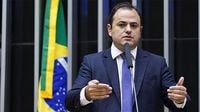On Wednesday, April 2, 2025, the Ethics and Parliamentary Decorum Council of the Chamber of Deputies convened at 11 am to deliberate on a recommendation regarding a breach of decorum against Deputy Glauber Braga (PSOL-RJ). The council is examining allegations brought by the Novo Party, which accuses Braga of physically assaulting Gabriel Costenaro, a member of the Movimento Brasil Livre (MBL), with shoves and kicks during an incident in April 2024.
The meeting comes as tensions rise around the case, which has drawn significant attention due to the nature of the allegations. A video captured the altercation, showing a heated exchange between Braga and Costenaro, culminating in Braga using physical force to expel the influencer from the Chamber. The Novo Party claims that Braga not only assaulted Costenaro but also threatened him should he attempt to enter the annex again.
In the aftermath of the incident, both individuals were escorted by agents from the Legislative Police Department (Depol) to register the occurrence. Braga later spoke to CNN, suggesting that Costenaro's actions were part of a "routine of provocation." According to MBL, Costenaro was visiting deputies' offices alongside app drivers to discuss Bill 12/2024, which aims to regulate the activities of workers in that sector.
The formal representation against Braga was filed by the Novo Party in April 2024. By September, the Ethics Council had approved the rapporteur's opinion, presented by Deputy Paulo Magalhães (PSD-BA), to proceed with the case. If the council ultimately endorses the recommendation, it could lead to sanctions such as suspension or even the loss of Braga's parliamentary mandate, with the final decision resting with the full House.
On this day, Magalhães reiterated his stance, stating that the evidence indicates Braga exceeded the rights associated with his mandate, thereby abusing his privileges as a parliamentarian. "Given the evidence produced in the records, it is clear that Glauber Braga has indeed practiced the conduct described in Article 4, Section I, of the Code of Ethics and Parliamentary Decorum of the Chamber of Deputies, warranting the sanction of loss of mandate," Magalhães asserted.
Braga's supporters expressed their discontent during the session, protesting against the report's findings. They carried banners proclaiming "Glauber stays" and accused the rapporteur of being a "lackey" for former Chamber President Arthur Lira (PP-AL). The session was suspended following a request for further time to analyze the case made by Deputy Chico Alencar (PSOL-RJ), a close ally of Braga.
In defense of his actions, Braga labeled Costenaro a "provocateur" and argued that his conduct was consistent with the MBL's modus operandi. He emphasized that he acted to defend his mother's honor, who had been the subject of Costenaro's insinuations regarding her health. The former mayor of Nova Friburgo, Saudade Braga, was gravely ill at the time and passed away just 22 days after the incident.
The council's proceedings have also sparked broader discussions about the ethics of parliamentary conduct and the standards to which elected officials are held. During the session, members of the PSOL caucus highlighted the disparity in the treatment of Braga compared to other parliamentarians facing serious allegations. Notably, Deputy Chiquinho Brazão (União-RJ), who has been detained for over a year on charges of being the mastermind behind the murder of former councilwoman Marielle Franco, continues to hold his mandate.
Talíria Petrone (RJ), the PSOL leader in the Chamber, criticized the situation, stating, "We want to revoke a deputy for expressing his opinion while allowing a deputy accused of orchestrating a murder to remain in office. This is an institution that is letting a person who allegedly ordered the execution of an elected councilwoman continue to serve. The penalty for him could be 40 years in prison, and yet he is still a deputy."
Throughout the proceedings, Braga has maintained that the report against him is politically motivated, claiming it was "bought" by Lira, who he has repeatedly accused of manipulating the process to shield himself from scrutiny. "The rapporteur, in his desperation to please those who actually wrote the report, didn't even disguise it. Who wrote your report was Mr. Arthur Lira," Braga stated. He further criticized the council's actions, asserting that the report was pre-filled and aimed at discrediting him.
The council's final decision on the matter is expected to be voted on in the coming week, following the request for a view, which delays the process. Should the Ethics Council approve Magalhães's report, Braga would have the option to appeal to the Constitution and Justice Commission (CCJ) in an attempt to overturn the decision. Ultimately, any resolution will require a vote by the plenary of the Chamber, where at least 257 out of 513 deputies must approve the revocation of Braga's mandate.
This case underscores the complex dynamics within Brazil's political landscape, where issues of decorum, accountability, and the influence of party politics intersect. As the situation unfolds, it remains to be seen how the Ethics Council will navigate the competing interests and pressures at play, and what implications this will have for the future of Deputy Glauber Braga.








